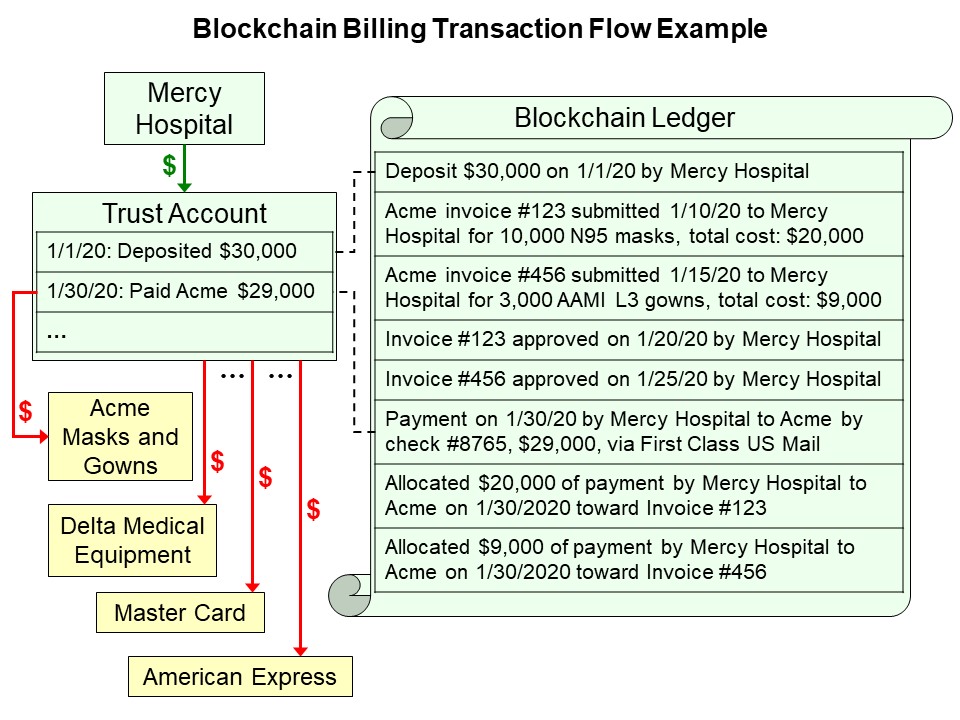Blockchain really isn't about cryptocurrency
It’s true that blockchain originally was developed as the basis for secure cryptocurrency.
However, the broader application of blockchain is really about security and has nothing to do with cryptocurrency.
A blockchain system can be designed so that a single blockchain transaction can reliably document and secure many actual database transactions and calculations.
In this way, an immutable log that strongly protects against tampering and fraud can be generated efficiently.
Trust becomes a major issue when:
-
A lot of money is involved
-
There are many independent customers
-
There are many suppliers of goods and services
-
Substantial overlap exists in what suppliers offer and customers need
-
An intermediary (e.g. a purchasing agent) could enable greater efficiency
Some of the most interesting and important public/private efforts have exactly these characteristics.
Potential blockchain applications worthy of consideration
-
Information / entertainment technology (video streaming, movie making, news aggregation)
-
Infrastructure projects (roads, bridges, water, sewage, electricity)
-
Climate change adaptation (flood control / hardening, alternative energy)
-
Just-in-time supply chain management (manufacturing, shipping, wholesale, retail)
-
Environmental (toxic site remediation, waste disposal, recycling, nuclear waste storage)
-
Pandemic / emergency medical response (supplies, equipment, drugs, staffing)
-
Disaster recovery (rescue, housing, food & water, field hospitals, loans and grants)
-
Purchasing services (corporate lodging / travel, procurement outsourcing, coop purchasing)
-
Broadband Internet expansion (fiber/cable modem, satellite, DSL, Broadband over Powerlines)
-
Transportation projects (high-speed rail, airport modernization)
-
Military / space / basic science development projects
In these kinds of applications, the amount of money regularly flowing between parties may become sizeable,
and there is a need for transparency, accountability, and trust.
There are often many paying customers participating in a project (i.e. local, state, federal, and even
multinational government agencies, plus large corporations and non-profits).
Such projects usually involve many suppliers of products and services, often with layers of subcontracting involved,
and these efforts can be brutally hard to fund.
An intermediary purchasing agent takes advantage of the potential economies of scale to deliver significant savings to customers.
Such an intermediary could be a primary contractor or an independent, specialized SaaS application.
This can offer substantial benefits by coordinating processes and making them more efficient, for example, through bulk buying and use of established connections and payment procedures.

The blockchain ledger guarantees a credible audit trail.
BBS Sample Application: “EmergencyMed”
Service for helping hospitals purchase equipment and supplies, especially in emergencies
BBS (Blockchain Billing Service) can be incorporated as a financial and database component in many types of SaaS (software-as-a-service) applications.
As an example, consider how a trusted billing system could be invaluable to a hypothetical, albeit much-needed, emergency healthcare supply chain service.
This is a good test case because it requires managing the rapid flow of large amounts of cash plus the quick procurement
and movement of physical goods that have exacting specifications.
Also, the scale of the problem naturally suggests the potential for achieving greater efficiency by introducing
an intermediary to coordinate similar purchases by multiple, independent entities.
With so many parties, possibly scattered across the globe, blockchain becomes critical in creating the necessary level
of trustworthiness and fraud resistance.
The EmergencyMed sample is designed to be incorporated into a business for helping hospitals source and purchase equipment and supplies, especially under emergency and shortage conditions. Such a purchasing service presumably requires a staff of industry, epidemiogical, and medical experts who help medical consortiums understand the need for and availability of supplies, equipment, and medicine.
There might be “account representatives” who work with the customers (medical institutions, public health organizations, and government agencies) to smooth the process of finding products, negotiating, ordering, paying, delivery, inspection, and resolving quality issues. The account representatives work directly with suppliers (manufacturers and pharmaceutical companies) and ensure rapid payment as agreed.
Naturally, a back-office staff is needed to support the system’s web application and financial transactions, but it needn’t be large for such a medical purchasing service to have an out-sized impact. For the business model, we assume that the service adds enough value and group savings to earn a modest, fixed commission on all successful deliveries.
BBS provides database, blockchain, and web application components for invoicing and payment.
They are designed to simplify audit and reduce opportunities for fraud and abuse.
The devil's in the details, and that's where blockchain comes in.